全国100所名校2020年第一次统一考试英语试题
(精校版)2020年全国卷Ⅰ英语高考试题文档版(含答案)

绝密★启用前2020年普通高等学校招生全国统一考试(全国卷I)英语注意事项:1. 答卷前,考生务必将自己的姓名、准考证号填写在答题卡和试卷指定位置上。
2. 回答选择题时,选出每小题答案后,用铅笔把答题卡上对应题目的答案标号涂黑。
如需改动,用橡皮擦干净后,再选涂其他答案标号。
回答非选择题时,将答案写在答题卡上,写在本试卷上无效。
3. 考试结束后,将本试卷和答题卡一并交回。
第一部分听力(共两节,满分30分)做题时,先将答案标在试卷上。
录音内容结束后,你将有两分钟的时间将试卷上的答案转涂到答题卡上。
第一节(共5小题;每小题1.5分,满分7.5分)听下面5段对话。
每段对话后有一个小题,从题中所给的A、B、C三个选项中选出最佳选项。
听完每段对话后,你都有10秒钟的时间来回答有关小题和阅读下一小题。
每段对话仅读一遍。
例:How much is the shirt?A. £19.15.B. £9.18.C. £9.15.答案是C。
1. Where are the speakers?A. At a swimming pool.B. In a clothing shop.C. At a school lab.2. What will Tom do next?A. Turn down the music.B. Postpone the show.C. Stop practicing.3. What is the woman busy doing?A. Working on a paper.B. Tidying up the office.C. Organizing a party.4. When will Henry start his vacation?A. This weekend.B. Next week.C. At the end of August.5. What does Donna offer to do for Bill?A. Book a flight for him.B. Drive him to the airport.C. Help him park the car.第二节(共15小题;每小题1.5分,满分22.5分)听下面5段对话或独白。
2020年普通高等学校招生全国统一考试英语试题(全国卷1,含解析)(1)
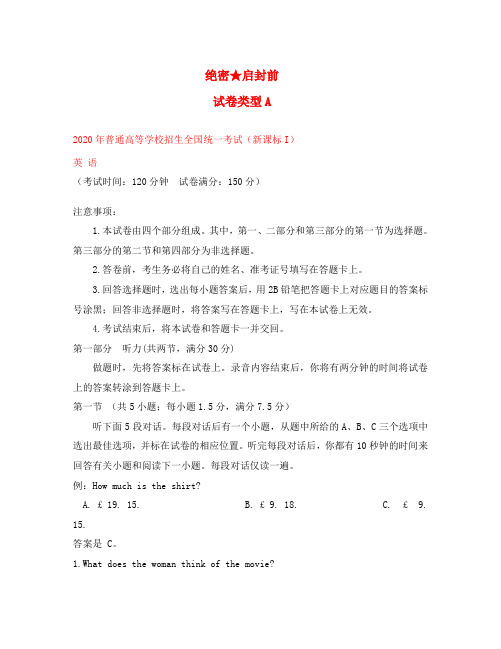
绝密★启封前试卷类型A2020年普通高等学校招生全国统一考试(新课标I)英语(考试时间:120分钟试卷满分:150分)注意事项:1.本试卷由四个部分组成。
其中,第一、二部分和第三部分的第一节为选择题。
第三部分的第二节和第四部分为非选择题。
2.答卷前,考生务必将自己的姓名、准考证号填写在答题卡上。
3.回答选择题时,选出每小题答案后,用2B铅笔把答题卡上对应题目的答案标号涂黑;回答非选择题时,将答案写在答题卡上,写在本试卷上无效。
4.考试结束后,将本试卷和答题卡一并交回。
第一部分听力(共两节,满分30分)做题时,先将答案标在试卷上。
录音内容结束后,你将有两分钟的时间将试卷上的答案转涂到答题卡上。
第一节(共5小题;每小题1.5分,满分7.5分)听下面5段对话。
每段对话后有一个小题,从题中所给的A、B、C三个选项中选出最佳选项,并标在试卷的相应位置。
听完每段对话后,你都有10秒钟的时间来回答有关小题和阅读下一小题。
每段对话仅读一遍。
例:How much is the shirt?A. £ 19. 15.B. £ 9. 18.C. £ 9.15.答案是 C。
1.What does the woman think of the movie?A.It’s amusingB.It’s excitingC.It’s disappointing2.How will Susan spend most of her time in France?A. Traveling aroundB.Studying at a schoolC.Looking after her aunt3.What are the speakers talking about?A. Going outB.Ordering drinksC.Preparing for a party4.Where are the speakers?A.In a classroomB.In a libraryC.In a bookstore5.What is the man going to do ?A.Go on the InternetB.Make a phone callC.Take a train trip 第二节(共15小题;每小题1.5分,满分22.5分)听下面5段对话或独白。
2020年全国卷Ⅰ英语高考试题文档版(含答案)
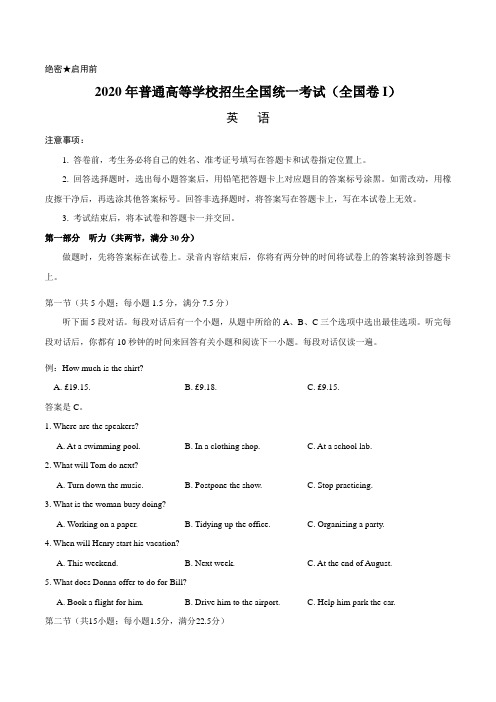
绝密★启用前2020年普通高等学校招生全国统一考试(全国卷I)英语注意事项:1. 答卷前,考生务必将自己的姓名、准考证号填写在答题卡和试卷指定位置上。
2. 回答选择题时,选出每小题答案后,用铅笔把答题卡上对应题目的答案标号涂黑。
如需改动,用橡皮擦干净后,再选涂其他答案标号。
回答非选择题时,将答案写在答题卡上,写在本试卷上无效。
3. 考试结束后,将本试卷和答题卡一并交回。
第一部分听力(共两节,满分30分)做题时,先将答案标在试卷上。
录音内容结束后,你将有两分钟的时间将试卷上的答案转涂到答题卡上。
第一节(共5小题;每小题1.5分,满分7.5分)听下面5段对话。
每段对话后有一个小题,从题中所给的A、B、C三个选项中选出最佳选项。
听完每段对话后,你都有10秒钟的时间来回答有关小题和阅读下一小题。
每段对话仅读一遍。
例:How much is the shirt?A. £19.15.B. £9.18.C. £9.15.答案是C。
1. Where are the speakers?A. At a swimming pool.B. In a clothing shop.C. At a school lab.2. What will Tom do next?A. Turn down the music.B. Postpone the show.C. Stop practicing.3. What is the woman busy doing?A. Working on a paper.B. Tidying up the office.C. Organizing a party.4. When will Henry start his vacation?A. This weekend.B. Next week.C. At the end of August.5. What does Donna offer to do for Bill?A. Book a flight for him.B. Drive him to the airport.C. Help him park the car.第二节(共15小题;每小题1.5分,满分22.5分)听下面5段对话或独白。
解析版:2020年普通高等学校招生全国统一考试考试英语试题(全国I卷 英语试题(一)
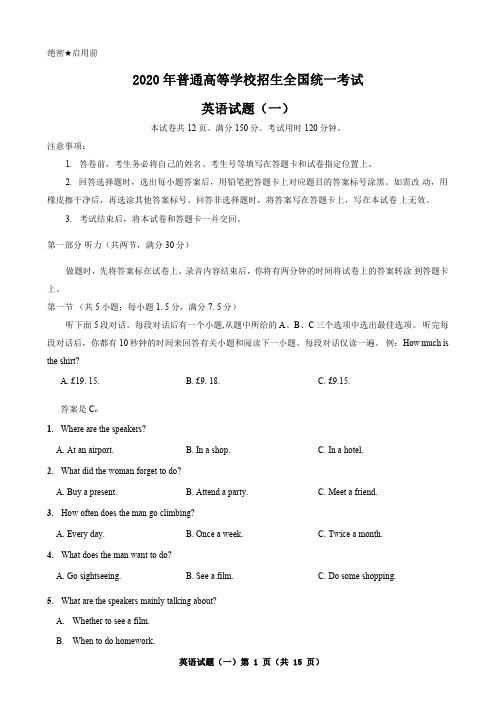
绝密★启用前2020年普通高等学校招生全国统一考试英语试题(一)本试卷共12页。
满分150分。
考试用时120分钟。
注意事项:1.答卷前,考生务必将自己的姓名、考生号等填写在答题卡和试卷指定位置上。
2.回答选择题时,选出每小题答案后,用铅笔把答题卡上对应题目的答案标号涂黑。
如需改动,用橡皮擦干净后,再选涂其他答案标号。
回答非选择题时,将答案写在答题卡上,写在本试卷上无效。
3.考试结束后,将本试卷和答题卡一并交回。
第一部分听力(共两节,满分30分)做题时,先将答案标在试卷上。
录音内容结束后,你将有两分钟的时间将试卷上的答案转涂到答题卡上。
第一节(共5小题;每小题1.5分,满分7.5分)听下面5段对话。
每段对话后有一个小题,从题中所给的A、B、C三个选项中选出最佳选项。
听完每段对话后,你都有10秒钟的时间来回答有关小题和阅读下一小题。
每段对话仅读一遍。
例:How much is the shirt?A.£19.15.B.£9.18.C.£9.15.答案是C o1.Where are the speakers?A.At an airport.B.In a shop.C.In a hotel.2.What did the woman forget to do?A.Buy a present.B.Attend a party.C.Meet a friend.3.How often does the man go climbing?A.Every day.B.Once a week.C.Twice a month.4.What does the man want to do?A.Go sightseeing.B.See a film.C.Do some shopping.5.What are the speakers mainly talking about?A.Whether to see a film.B.When to do homework.C.What to do before going out.第二节(共15小题;每小题1.5分,满分22.5分)听下面5段对话或独白。
2020年全国卷Ⅰ英语高考试题文档版(含答案、两份听力)
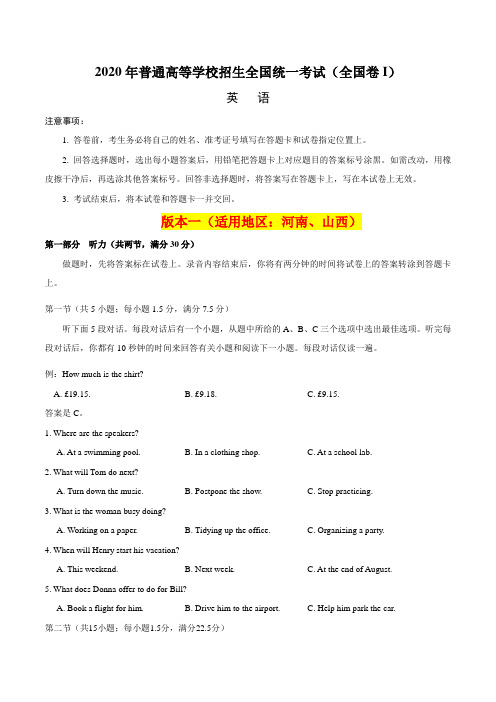
2020年普通高等学校招生全国统一考试(全国卷I)英语注意事项:1. 答卷前,考生务必将自己的姓名、准考证号填写在答题卡和试卷指定位置上。
2. 回答选择题时,选出每小题答案后,用铅笔把答题卡上对应题目的答案标号涂黑。
如需改动,用橡皮擦干净后,再选涂其他答案标号。
回答非选择题时,将答案写在答题卡上,写在本试卷上无效。
3. 考试结束后,将本试卷和答题卡一并交回。
版本一(适用地区:河南、山西)第一部分听力(共两节,满分30分)做题时,先将答案标在试卷上。
录音内容结束后,你将有两分钟的时间将试卷上的答案转涂到答题卡上。
第一节(共5小题;每小题1.5分,满分7.5分)听下面5段对话。
每段对话后有一个小题,从题中所给的A、B、C三个选项中选出最佳选项。
听完每段对话后,你都有10秒钟的时间来回答有关小题和阅读下一小题。
每段对话仅读一遍。
例:How much is the shirt?A. £19.15.B. £9.18.C. £9.15.答案是C。
1. Where are the speakers?A. At a swimming pool.B. In a clothing shop.C. At a school lab.2. What will Tom do next?A. Turn down the music.B. Postpone the show.C. Stop practicing.3. What is the woman busy doing?A. Working on a paper.B. Tidying up the office.C. Organizing a party.4. When will Henry start his vacation?A. This weekend.B. Next week.C. At the end of August.5. What does Donna offer to do for Bill?A. Book a flight for him.B. Drive him to the airport.C. Help him park the car.第二节(共15小题;每小题1.5分,满分22.5分)听下面5段对话或独白。
2020年全国统一高考英语试卷以及答案(全国1卷解析版)
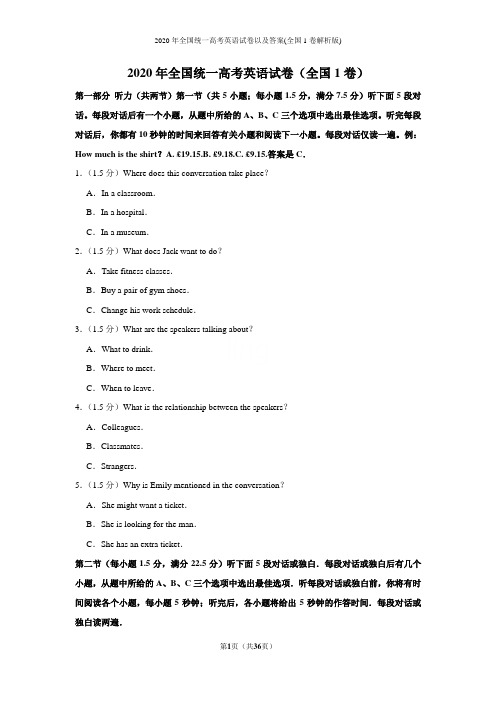
2020年全国统一高考英语试卷(全国1卷)第一部分听力(共两节)第一节(共5小题;每小题1.5分,满分7.5分)听下面5段对话。
每段对话后有一个小题,从题中所给的A、B、C三个选项中选出最佳选项。
听完每段对话后,你都有10秒钟的时间来回答有关小题和阅读下一小题。
每段对话仅读一遍。
例:How much is the shirt?A. £19.15.B. £9.18.C. £9.15.答案是C.1.(1.5分)Where does this conversation take place?A.In a classroom.B.In a hospital.C.In a museum.2.(1.5分)What does Jack want to do?A.Take fitness classes.B.Buy a pair of gym shoes.C.Change his work schedule.3.(1.5分)What are the speakers talking about?A.What to drink.B.Where to meet.C.When to leave.4.(1.5分)What is the relationship between the speakers?A.Colleagues.B.Classmates.C.Strangers.5.(1.5分)Why is Emily mentioned in the conversation?A.She might want a ticket.B.She is looking for the man.C.She has an extra ticket.第二节(每小题1.5分,满分22.5分)听下面5段对话或独白.每段对话或独白后有几个小题,从题中所给的A、B、C三个选项中选出最佳选项.听每段对话或独白前,你将有时间阅读各个小题,每小题5秒钟;听完后,各小题将给出5秒钟的作答时间.每段对话或独白读两遍.6.(3分)听材料,回答下列问题.(1)How long did James run his business?A.10 years.B.13 years.C.15 years.(2)How does the woman feel about James' situation?A.Embarrassed.B.Concerned.C.Disappointed.7.(4.5分)听材料,回答下列问题.(1)What has Kate's mother decided to do?A.Return to school.B.Change her job.C.Retire from work.(2)What did Kate's mother study at college?A.Oil painting.B.Art history.C.Business administration.(3)What is Kate's attitude toward her mother's decision?A.Disapproving.B.Ambiguous.C.Understanding.8.(4.5分)听材料,回答下列问题.(1)What is the man doing?A.Chairing a meeting.B.Hosting a radio program.C.Conducting a job interview.(2)What benefits Mary most in her job?A.Her wide reading.B.Her leaders' guidance.C.Her friends' help.(3)Who will Mary talk about next?A.Her teacher.B.Her father.C.Her mother.9.(6分)听材料,回答下列问题.(1)Why does the man seldom do exercise?A.He lacks motivation.B.He has a heart problem.C.He works all the time.(2)What does Jacob Sattelmair probably do?A.He's an athlete.B.He's a researcher.C.He's a journalist.(3)Why does the woman speak of a study?A.To encourage the man.B.To recommend an exercise.C.To support her findings.(4)How much time will the man probably spend exercising weekly?A.300 minutes.B.150 minutes.C.75 minutes.10.(4.5分)听材料,回答下列问题.(1)What did the scientists do to the road?A.They repaired it.B.They painted it.C.They blocked it.(2)Why are young birds drawn to the road surface?A.It's warm.B.It's brown.C.It's smooth.(3)What is the purpose of the scientists' experiment?A.To keep the birds there for a whole year.B.To help students study the birds well.C.To prevent the birds from being killed.第二部分阅读理解(共两节)第一节(满分30分)阅读下列短文,从每题所给的A、B、C和D四个选项中,选出最佳选项。
2020年高考全国卷Ⅰ英语试题及答案(WORD版)
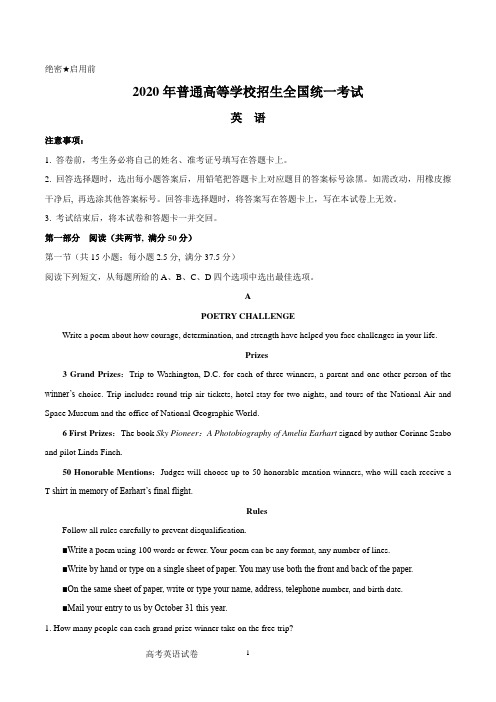
绝密★启用前2020年普通高等学校招生全国统一考试英语注意事项:1. 答卷前,考生务必将自己的姓名、准考证号填写在答题卡上。
2. 回答选择题时,选出每小题答案后,用铅笔把答题卡上对应题目的答案标号涂黑。
如需改动,用橡皮擦干净后, 再选涂其他答案标号。
回答非选择题时,将答案写在答题卡上,写在本试卷上无效。
3. 考试结束后,将本试卷和答题卡一并交回。
第一部分阅读(共两节, 满分50分)第一节(共15小题;每小题2.5分, 满分37.5分)阅读下列短文,从每题所给的A、B、C、D四个选项中选出最佳选项。
APOETRY CHALLENGEWrite a poem about how courage, determination, and strength have helped you face challenges in your life.Prizes3 Grand Prizes:Trip to Washington, D.C. for each of three winners, a parent and one other person of the winner’s choice. Trip includes round-trip air tickets, hotel stay for two nights, and tours of the National Air and Space Museum and the office of National Geographic World.6 First Prizes:The book Sky Pioneer:A Photobiography of Amelia Earhart signed by author Corinne Szabo and pilot Linda Finch.50 Honorable Mentions:Judges will choose up to 50 honorable mention winners, who will each receive a T-shirt in memory of Earhart’s final flight.RulesFollow all rules carefully to prevent disqualification.■Write a p oem using 100 words or fewer. Your poem can be any format, any number of lines.■Write by hand or type on a single sheet of paper. You may use both the front and back of the paper.■On the same sheet of paper, write or type your name, address, telephone number, and birth date.■Mail your entry to us by October 31 this year.1. How many people can each grand prize winner take on the free trip?A. Two.B. Three.C. Four.D. Six.2. What will each of the honorable mention winners get?A. A plane ticket.B. A book by Corinne Szabo.C. A special T-shirt.D. A photo of Amelia Earhart.3. Which of the following will result in disqualification?A. Typing your poem out.B. Writing a poem of 120 words.C. Using both sides of the paper.D. Mailing your entry on October 30.BJenifer Mauer has needed more willpower than the typical college student to pursue her goal of earning a nursing degree. That willpower bore fruit when Jennifer graduated from University of Wisconsin-Eau Claire and became the first in her large family to earn a bachelor’s degree.Mauer, of Edgar, Wisconsin, grew up on a farm in a family of 10 children. Her dad worked at a job away from the farm, and her mother ran the farm with the kids. After high school, Jennifer attended a local technical college, working to pay her tuition(学费), because there was no extra money set aside for a college education. After graduation, she worked to help her sisters and brothers pay for their schooling.Jennifer now is married and has three children of her own. She decided to go back to college to advance her career and to be able to better support her family while doing something she loves: nursing. She chose the UW-Eau Claire program at Ministry Saint Joseph’s Hospital in Marshfield because she was able to pursue her four-year degree close to home. She could drive to class and be home in the evening to help with her kids. Jennifer received great support from her family as she worked to earn her degree: Her husband worked two jobs to cover the bills, and her 68-year-old mother helped take care of the children at times.Through it all, she remained in good academic standing and graduated with honors. Jennifer sacrificed(牺牲)to achieve her goal, giving up many nights with her kids and missing important events to study. “Some nights my heart was breaking to have to pick between my kids and studying for exams or papers,” she says. However, her children have learned an important lesson witnessing their mother earn her degree. Jennifer is a first-generation graduate and an inspiration to her family —and that’s pretty powerful.4. What did Jennifer do after high school?A. She helped her dad with his work.B. She ran the family farm on her own.C. She supported herself through college.D. She taught her sisters and brothers at home.5. Why did Jennifer choose the program at Ministry Saint Joseph’s Hospital in Marshfield?A. To take care of her kids easily.B. To learn from the best nurses.C. To save money for her parents.D. To find a well-paid job there.6. What did Jennifer sacrifice to achieve her goal?A. Her health.B. Her time with family.C. Her reputation.D. Her chance of promotion.7. What can we learn from Jenifer’s story?A. Time is money.B. Love breaks down barriers.C. Hard work pays off.D. Education is the key to success.CIn the mid-1990s, Tom Bissell taught English as a volunteer in Uzbekistan. He left after seven months, physically broken and having lost his mind. A few years later, still attracted to the country, he returned to Uzbekistan to write an article about the disappearance of the Aral Sea.His visit, however, ended up involving a lot more than that. Hence this book, Chasing the Sea: Lost Among the Ghosts of Empire in Central Asia, which talks about a road trip from Tashkent to Karakalpakstan, where millions of lives have been destroyed by the slow drying up of the sea. It is the story of an American travelling to a strange land, and of the people he meets on his way: Rustam, his translator, a lovely 24-year-old who picked up his colorful English in California, Oleg and Natasha, his hosts in Tashkent, and a string of foreign aid workers.This is a quick look at life in Uzbekistan, made of friendliness and warmth, but also its darker side of society. In Samarkand, Mr Bissell admires the architectural wonders, while on his way to Bukhara he gets a taste of police methods when suspected of drug dealing. In Ferghana, he attends a mountain funeral(葬礼)followed by a strange drinking party. And in Karakalpakstan, he is saddened by the dust storms, diseases and fishing boats stuck miles from the sea.Mr Bissell skillfully organizes historical insights and cultural references, making his tale a well-rounded picture of Uzbekistan, seen from Western eyes. His judgment and references are decidedly American, as well as his delicate stomach. As the author explains, this is neither a travel nor a history book, or even a piece of reportage. Whatever it is, the result is a fine and vivid description of the purest of Central Asian traditions.8. What made Mr Bissell return to Uzbekistan?A. His friends’ invitation.B. His interest in the country.C. His love for teaching.D. His desire to regain health.9. What does the underlined word “that” in paragraph 2 refer to?A. Developing a serious mental disease.B. Taking a guided tour in Central Asia.C. Working as a volunteer in Uzbekistan.D. Writing an article about the Aral Sea.10. Which of the following best describes Mr Bissell’s road trip in Uzbekistan?A. Romantic.B. Eventful.C. Pleasant.D. Dangerous.11. What is the purpose of this text?A. To introduce a book.B. To explain a cultural phenomenon.C. To remember a writer.D. To recommend a travel destination.DAccording to a recent study in the Journal of Consumer Research, both the size and consumption habits of our eating companions can influence our food intake. And contrary to existing research that says you should avoid eating with heavier people who order large portions(份), it’s the beanpoles with big appetites you really need to avoid.To test the effect of social influence on eating habits, the researchers conducted two experiments. In the first, 95 undergraduate women were individually invited into a lab to ostensibly(表面上)participate in a study about movie viewership. Before the film began, each woman was asked to help herself to a snack. An actor hired by the researchers grabbed her food first. In her natural state, the actor weighed 105 pounds. But in half the cases she wore a specially designed fat suit which increased her weight to 180 pounds.Both the fat and thin versions of the actor took a large amount of food. The participants followed suit, taking more food than they normally would have. However, they took significantly more when the actor was thin.For the second test, in one case the thin actor took two pieces of candy from the snack bowls. In the other case, she took 30 pieces. The results were similar to the first test: the participants followed suit but took significantly more candy when the thin actor took 30 pieces.The tests show that the social environment is extremely influential when we’re making decisions. If this fellow participant is going to eat more, so will I. Call it the “I’ll have what she’s having” effect. However, we’ll adjust the influe nce. If an overweight person is having a large portion, I’ll hold back a bit because I see the results of his eating habits. But if a thin person eats a lot, I’ll follow suit. If he can eat much and keep slim, why can’t I?12. What is the recent study mainly about?A. Food safety.B. Movie viewership.C. Consumer demand.D. Eating behavior.13. What does the underlined word "beanpoles" in paragraph 1 refer to?A. Big eaters.B. Overweight persons.C. Picky eaters.D. Tall thin persons.14. Why did the researchers hire the actor?A. To see how she would affect the participants.B. To test if the participants could recognize her.C. To find out what she would do in the two tests.D. To study why she could keep her weight down.15. On what basis do we "adjust the influence" according to the last paragraph?A. How hungry we are.B. How slim we want to be.C. How we perceive others.D. How we feel about the food.第二节(共5小题:每小题2. 5分, 满分12. 5分)阅读下面短文, 从短文后的选项中选出可以填入空白处的最佳选项。
全国一卷百校大联考2020届高三考试-英语试题(含答案听力文字无听力音频材料)
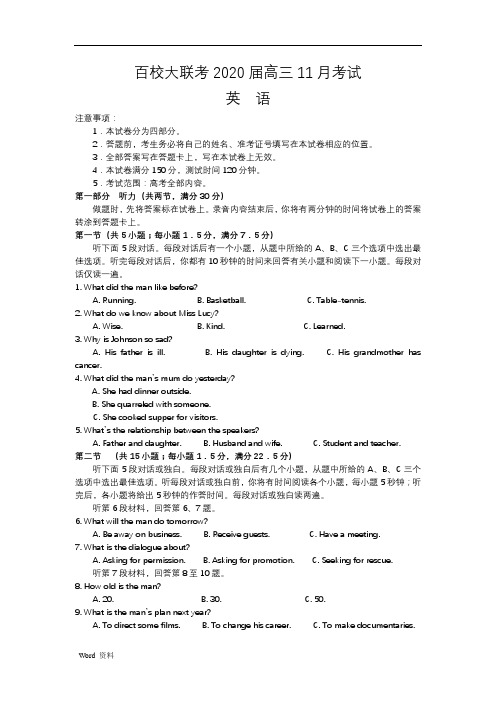
百校大联考2020届高三11月考试英语注意事项:1.本试卷分为四部分。
2.答题前,考生务必将自己的姓名、准考证号填写在本试卷相应的位置。
3.全部答案写在答题卡上,写在本试卷上无效。
4.本试卷满分150分,测试时间120分钟。
5.考试范围:高考全部内容。
第一部分听力(共两节,满分30分)做题时,先将答案标在试卷上。
录音内容结束后,你将有两分钟的时间将试卷上的答案转涂到答题卡上。
第一节(共5小题;每小题1.5分,满分7.5分)听下面5段对话。
每段对话后有一个小题,从题中所给的A、B、C三个选项中选出最佳选项。
听完每段对话后,你都有10秒钟的时间来回答有关小题和阅读下一小题。
每段对话仅读一遍。
1. What did the man like before?A. Running.B. Basketball.C. Table-tennis.2. What do we know about Miss Lucy?A. Wise.B. Kind.C. Learned.3. Why is Johnson so sad?A. His father is ill.B. His daughter is dying.C. His grandmother has cancer.4. What did the man’s mum do yesterday?A. She had dinner outside.B. She quarreled with someone.C. She cooked supper for visitors.5. What’s the relationship between the speakers?A. Father and daughter.B. Husband and wife.C. Student and teacher.第二节(共15小题;每小题1.5分,满分22.5分)听下面5段对话或独白。
4.百校联盟2020届一月全国大联考英语试题含答案
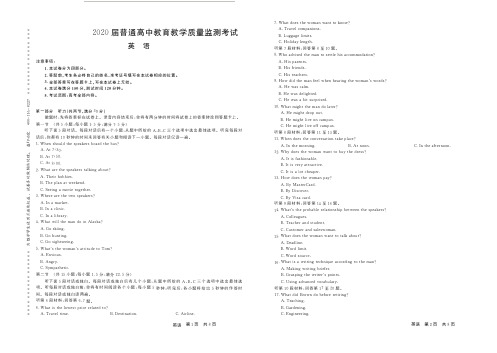
What: Empire originally opened in 1932 and was described as a modern building; back then it could seat
600 customers.The cinema reopened in 1993 and the main circle still holds on to its art deco architecture.
A. Making writing briefer. B. Grasping the writer ’s points.
C. Using advanced vocabulary.
听第10段材料,回答第17至20题。
17. What did Brown do before retiring?
A. Teaching.
N∞-
2 7
第 一 部分 昕力(共两节,满分30分)
00寸
做题时,先将答案标在试卷上。录音内容结束后,你将有两分钟的时间将试卷上的答案转涂到答题卡上。 第一节 (共5小题;每小题1. 5分,满分7. 5分)
眼
听下面5段对话。每段对话后有一个小题,从题中所给的A、B、C三个选项中选出最佳选项。听完每段对
bigger screens and 5. 1 Dolby Audio.
Where: High Street, Sittingbourne, MElO 4PE
Ticket prices: General admission一£3
21. What can we know about the Palace Cinema?
A.A student.
B.A professor.
2020年普通高等学校招生全国统一考试英语试题(全国卷1,参考版解析)
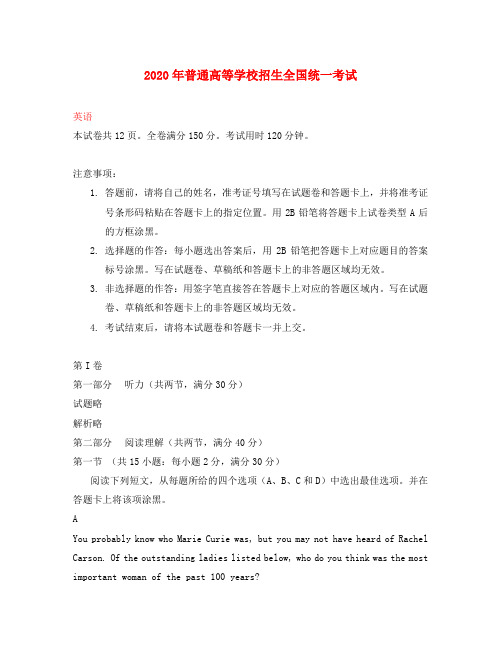
2020年普通高等学校招生全国统一考试英语本试卷共12页。
全卷满分150分。
考试用时120分钟。
注意事项:1.答题前,请将自己的姓名,准考证号填写在试题卷和答题卡上,并将准考证号条形码粘贴在答题卡上的指定位置。
用2B铅笔将答题卡上试卷类型A后的方框涂黑。
2.选择题的作答:每小题选出答案后,用2B铅笔把答题卡上对应题目的答案标号涂黑。
写在试题卷、草稿纸和答题卡上的非答题区域均无效。
3.非选择题的作答:用签字笔直接答在答题卡上对应的答题区域内。
写在试题卷、草稿纸和答题卡上的非答题区域均无效。
4.考试结束后,请将本试题卷和答题卡一并上交。
第I卷第一部分听力(共两节,满分30分)试题略解析略第二部分阅读理解(共两节,满分40分)第一节(共15小题:每小题2分,满分30分)阅读下列短文,从每题所给的四个选项(A、B、C和D)中选出最佳选项。
并在答题卡上将该项涂黑。
AYou probably know who Marie Curie was, but you may not have heard of Rachel Carson. Of the outstanding ladies listed below, who do you think was the most important woman of the past 100 years?Jane Addams (1860-1935)Anyone who has ever been helped by a social worker has Jane Addams to thank. Addams helped the poor and worked for peace. She encouraged a sense of community (社区) by creating shelters and promoting education and services for people in need. In 1931, Addams became the first American woman to win the Nobel Peace Prize.Rachel Carson (1907-1964)If it weren’t for Rachel Carson, the environment al movement might not exist today. Her popular 1962 book Silent Spring raised awareness of the dangers of pollution and the harmful effects of chemicals on humans and on the world’s lakes and oceans.Sandra Day O’Connor (1930-present)When Sandra Day O’Connor finished third in her class at Stanford Law School, in 1952, she could not find work at a law firm because she was a woman. She became an Arizona state senator (参议员) and, in 1981, the first woman to join the U.S. Supreme Court. O’Connor gave the deciding vote in many important cases during her 24 years on the top court.Rosa Parks (1913-2020)On December 1. 1995, in Montgomery, Alabama, Rosa Parks would not give up her seat on a bus to a white passenger. Her simple act landed Parks in prison. But it also set off the Montgomery bus boycott. It lasted for more than a year, and kicked off the civil-rights movement. “The only tired I was, was tired of giving in,” said Parks.21. What is Jane Addams noted for in history?A. Her social work.B. Her teaching skills.C. Her efforts to win a prize.D. Her community background.22. What was the reason for O’Connor’s being rejected by the law firm?A. Her lack of proper training in law.B. Her little work experience in court.C. The discrimination against women.D. The poor financial conditions.23. Who made a great contribution to the civil-rights movement in the U.S.?A. Jane Addams.B. Rachel Carson.C. Sandra Day O’C onnorD. Rosa Parks.24. What can we infer about the women mentioned in the text?A. They are highly educated.B. They are truly creative.C. They are pioneers.D. They are peace-lovers.21.【解析】A信息概括题。
2020年普通高等学校招生全国统一考试英语(全国卷I)(含答案)(Word精校版
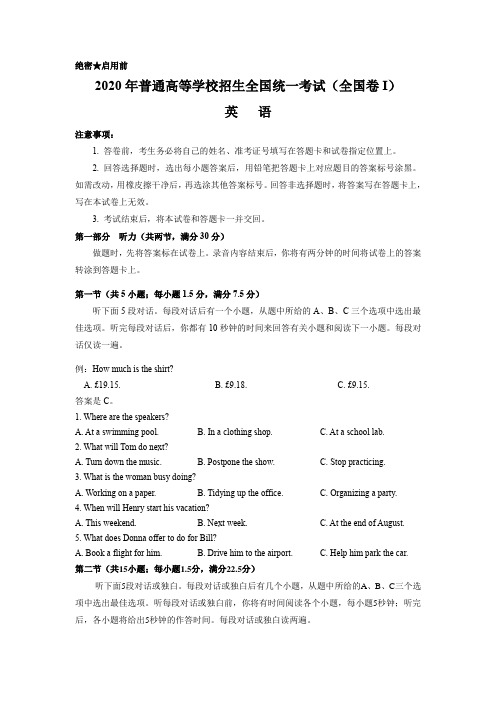
绝密★启用前2020年普通高等学校招生全国统一考试(全国卷I)英语注意事项:1. 答卷前,考生务必将自己的姓名、准考证号填写在答题卡和试卷指定位置上。
2. 回答选择题时,选出每小题答案后,用铅笔把答题卡上对应题目的答案标号涂黑。
如需改动,用橡皮擦干净后,再选涂其他答案标号。
回答非选择题时,将答案写在答题卡上,写在本试卷上无效。
3. 考试结束后,将本试卷和答题卡一并交回。
第一部分听力(共两节,满分30分)做题时,先将答案标在试卷上。
录音内容结束后,你将有两分钟的时间将试卷上的答案转涂到答题卡上。
第一节(共5小题;每小题1.5分,满分7.5分)听下面5段对话。
每段对话后有一个小题,从题中所给的A、B、C三个选项中选出最佳选项。
听完每段对话后,你都有10秒钟的时间来回答有关小题和阅读下一小题。
每段对话仅读一遍。
例:How much is the shirt?A. £19.15.B. £9.18.C. £9.15.答案是C。
1. Where are the speakers?A. At a swimming pool.B. In a clothing shop.C. At a school lab.2. What will Tom do next?A. Turn down the music.B. Postpone the show.C. Stop practicing.3. What is the woman busy doing?A. Working on a paper.B. Tidying up the office.C. Organizing a party.4. When will Henry start his vacation?A. This weekend.B. Next week.C. At the end of August.5. What does Donna offer to do for Bill?A. Book a flight for him.B. Drive him to the airport.C. Help him park the car.第二节(共15小题;每小题1.5分,满分22.5分)听下面5段对话或独白。
2020年全国普通高等学校招生统一考试英语试卷 全国Ⅰ卷(含答案)

绝密★启用前2020年普通高等学校招生全国统一考试(全国卷I)英语注意事项:1. 答卷前,考生务必将自己的姓名、准考证号填写在答题卡和试卷指定位置上。
2. 回答选择题时,选出每小题答案后,用铅笔把答题卡上对应题目的答案标号涂黑。
如需改动,用橡皮擦干净后,再选涂其他答案标号。
回答非选择题时,将答案写在答题卡上,写在本试卷上无效。
3. 考试结束后,将本试卷和答题卡一并交回。
第一部分听力(共两节,满分30分)做题时,先将答案标在试卷上。
录音内容结束后,你将有两分钟的时间将试卷上的答案转涂到答题卡上。
第一节(共5小题;每小题1.5分,满分7.5分)听下面5段对话。
每段对话后有一个小题,从题中所给的A、B、C三个选项中选出最佳选项。
听完每段对话后,你都有10秒钟的时间来回答有关小题和阅读下一小题。
每段对话仅读一遍。
例:How much is the shirt?A. £19.15.B. £9.18.C. £9.15.答案是C。
1. Where are the speakers?A. At a swimming pool.B. In a clothing shop.C. At aschool lab.2. What will Tom do next?A. Turn down the music.B. Postpone the show.C.Stop practicing.3. What is the woman busy doing?A. Working on a paper.B. Tidying up the office.C. Organizing a party.4. When will Henry start his vacation?A. This weekend.B. Next week.C. At theend of August.5. What does Donna offer to do for Bill?A. Book a flight for him.B. Drive him to the airport.C. Help him park the car.第二节(共15小题;每小题1.5分,满分22.5分)听下面5段对话或独白。
2020年普通高等学校招生全国统一考试(全国卷I)英语(含答案)
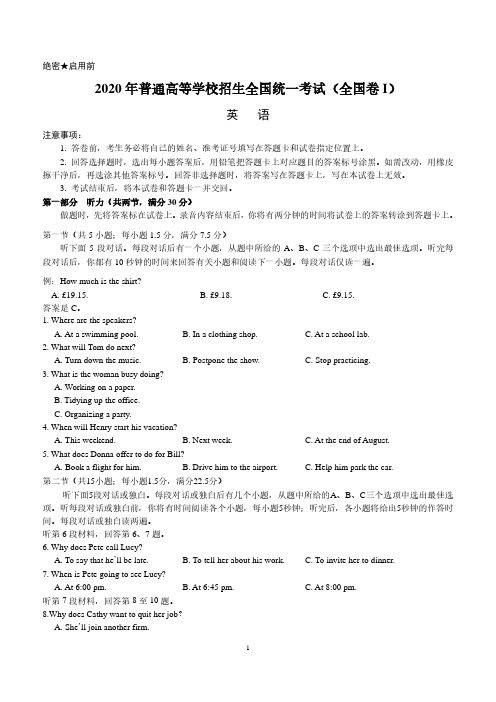
B. Drive him to the airport.
C. Help him park the car.
第二节(共15小题;每小题1.5分,满分22.5分)
听下面5段对话或独白。每段对话或独白后有几个小题,从题中所给的A、B、C三个选项中选出最佳选
项。听每段对话或独白前,你将有时间阅读各个小题,每小题5秒钟;听完后,各小题将给出5秒钟的作答时
4. When will Henry start his vacation?
A. This weekend.
B. Next week.
C. At the end of August.
5. What does Donna offer to do for Bill?
A. Book a flight for him.
D. Check the train schedule.
22. At which station can you find the lost property office?
A. Altandi.
B. Roma Street.
C. Varsity Lakes.
D. Fortitude Valley.
例:How much is the shirt?
A. £19.15.
B. £9.18.
C. £9.15.
答案是 C。
1. Where are the speakers?
A. At a swimming pool.
B. In a clothing shop.
C. At a school lab.
2. What will Tom do next?
Guardian trains (outbound)
2020年高考全国卷Ⅰ英语试题及答案(WORD版)

绝密★启用前2020年普通高等学校招生全国统一考试英语注意事项:1. 答卷前,考生务必将自己的姓名、准考证号填写在答题卡上。
2. 回答选择题时,选出每小题答案后,用铅笔把答题卡上对应题目的答案标号涂黑。
如需改动,用橡皮擦干净后, 再选涂其他答案标号。
回答非选择题时,将答案写在答题卡上,写在本试卷上无效。
3. 考试结束后,将本试卷和答题卡一并交回。
第一部分阅读(共两节, 满分50分)第一节(共15小题;每小题2.5分, 满分37.5分)阅读下列短文,从每题所给的A、B、C、D四个选项中选出最佳选项。
APOETRY CHALLENGEWrite a poem about how courage, determination, and strength have helped you face challenges in your life.Prizes3 Grand Prizes:Trip to Washington, D.C. for each of three winners, a parent and one other person of the winner’s choice. Trip includes round-trip air tickets, hotel stay for two nights, and tours of the National Air and Space Museum and the office of National Geographic World.6 First Prizes:The book Sky Pioneer:A Photobiography of Amelia Earhart signed by author Corinne Szabo and pilot Linda Finch.50 Honorable Mentions:Judges will choose up to 50 honorable mention winners, who will each receive a T-shirt in memory of Earhart’s final flight.RulesFollow all rules carefully to prevent disqualification.■Write a p oem using 100 words or fewer. Your poem can be any format, any number of lines.■Write by hand or type on a single sheet of paper. You may use both the front and back of the paper.■On the same sheet of paper, write or type your name, address, telephone number, and birth date.■Mail your entry to us by October 31 this year.1. How many people can each grand prize winner take on the free trip?A. Two.B. Three.C. Four.D. Six.2. What will each of the honorable mention winners get?A. A plane ticket.B. A book by Corinne Szabo.C. A special T-shirt.D. A photo of Amelia Earhart.3. Which of the following will result in disqualification?A. Typing your poem out.B. Writing a poem of 120 words.C. Using both sides of the paper.D. Mailing your entry on October 30.BJenifer Mauer has needed more willpower than the typical college student to pursue her goal of earning a nursing degree. That willpower bore fruit when Jennifer graduated from University of Wisconsin-Eau Claire and became the first in her large family to earn a bachelor’s degree.Mauer, of Edgar, Wisconsin, grew up on a farm in a family of 10 children. Her dad worked at a job away from the farm, and her mother ran the farm with the kids. After high school, Jennifer attended a local technical college, working to pay her tuition(学费), because there was no extra money set aside for a college education. After graduation, she worked to help her sisters and brothers pay for their schooling.Jennifer now is married and has three children of her own. She decided to go back to college to advance her career and to be able to better support her family while doing something she loves: nursing. She chose the UW-Eau Claire program at Ministry Saint Joseph’s Hospital in Marshfield because she was able to pursue her four-year degree close to home. She could drive to class and be home in the evening to help with her kids. Jennifer received great support from her family as she worked to earn her degree: Her husband worked two jobs to cover the bills, and her 68-year-old mother helped take care of the children at times.Through it all, she remained in good academic standing and graduated with honors. Jennifer sacrificed(牺牲)to achieve her goal, giving up many nights with her kids and missing important events to study. “Some nights my heart was breaking to have to pick between my kids and studying for exams or papers,” she says. However, her children have learned an important lesson witnessing their mother earn her degree. Jennifer is a first-generation graduate and an inspiration to her family —and that’s pretty powerful.4. What did Jennifer do after high school?A. She helped her dad with his work.B. She ran the family farm on her own.C. She supported herself through college.D. She taught her sisters and brothers at home.5. Why did Jennifer choose the program at Ministry Saint Joseph’s Hospital in Marshfield?A. To take care of her kids easily.B. To learn from the best nurses.C. To save money for her parents.D. To find a well-paid job there.6. What did Jennifer sacrifice to achieve her goal?A. Her health.B. Her time with family.C. Her reputation.D. Her chance of promotion.7. What can we learn from Jenifer’s story?A. Time is money.B. Love breaks down barriers.C. Hard work pays off.D. Education is the key to success.CIn the mid-1990s, Tom Bissell taught English as a volunteer in Uzbekistan. He left after seven months, physically broken and having lost his mind. A few years later, still attracted to the country, he returned to Uzbekistan to write an article about the disappearance of the Aral Sea.His visit, however, ended up involving a lot more than that. Hence this book, Chasing the Sea: Lost Among the Ghosts of Empire in Central Asia, which talks about a road trip from Tashkent to Karakalpakstan, where millions of lives have been destroyed by the slow drying up of the sea. It is the story of an American travelling to a strange land, and of the people he meets on his way: Rustam, his translator, a lovely 24-year-old who picked up his colorful English in California, Oleg and Natasha, his hosts in Tashkent, and a string of foreign aid workers.This is a quick look at life in Uzbekistan, made of friendliness and warmth, but also its darker side of society. In Samarkand, Mr Bissell admires the architectural wonders, while on his way to Bukhara he gets a taste of police methods when suspected of drug dealing. In Ferghana, he attends a mountain funeral(葬礼)followed by a strange drinking party. And in Karakalpakstan, he is saddened by the dust storms, diseases and fishing boats stuck miles from the sea.Mr Bissell skillfully organizes historical insights and cultural references, making his tale a well-rounded picture of Uzbekistan, seen from Western eyes. His judgment and references are decidedly American, as well as his delicate stomach. As the author explains, this is neither a travel nor a history book, or even a piece of reportage. Whatever it is, the result is a fine and vivid description of the purest of Central Asian traditions.8. What made Mr Bissell return to Uzbekistan?A. His friends’ invitation.B. His interest in the country.C. His love for teaching.D. His desire to regain health.9. What does the underlined word “that” in paragraph 2 refer to?A. Developing a serious mental disease.B. Taking a guided tour in Central Asia.C. Working as a volunteer in Uzbekistan.D. Writing an article about the Aral Sea.10. Which of the following best describes Mr Bissell’s road trip in Uzbekistan?A. Romantic.B. Eventful.C. Pleasant.D. Dangerous.11. What is the purpose of this text?A. To introduce a book.B. To explain a cultural phenomenon.C. To remember a writer.D. To recommend a travel destination.DAccording to a recent study in the Journal of Consumer Research, both the size and consumption habits of our eating companions can influence our food intake. And contrary to existing research that says you should avoid eating with heavier people who order large portions(份), it’s the beanpoles with big appetites you really need to avoid.To test the effect of social influence on eating habits, the researchers conducted two experiments. In the first, 95 undergraduate women were individually invited into a lab to ostensibly(表面上)participate in a study about movie viewership. Before the film began, each woman was asked to help herself to a snack. An actor hired by the researchers grabbed her food first. In her natural state, the actor weighed 105 pounds. But in half the cases she wore a specially designed fat suit which increased her weight to 180 pounds.Both the fat and thin versions of the actor took a large amount of food. The participants followed suit, taking more food than they normally would have. However, they took significantly more when the actor was thin.For the second test, in one case the thin actor took two pieces of candy from the snack bowls. In the other case, she took 30 pieces. The results were similar to the first test: the participants followed suit but took significantly more candy when the thin actor took 30 pieces.The tests show that the social environment is extremely influential when we’re making decisions. If this fellow participant is going to eat more, so will I. Call it the “I’ll have what she’s having” effect. However, we’ll adjust the influe nce. If an overweight person is having a large portion, I’ll hold back a bit because I see the results of his eating habits. But if a thin person eats a lot, I’ll follow suit. If he can eat much and keep slim, why can’t I?12. What is the recent study mainly about?A. Food safety.B. Movie viewership.C. Consumer demand.D. Eating behavior.13. What does the underlined word "beanpoles" in paragraph 1 refer to?A. Big eaters.B. Overweight persons.C. Picky eaters.D. Tall thin persons.14. Why did the researchers hire the actor?A. To see how she would affect the participants.B. To test if the participants could recognize her.C. To find out what she would do in the two tests.D. To study why she could keep her weight down.15. On what basis do we "adjust the influence" according to the last paragraph?A. How hungry we are.B. How slim we want to be.C. How we perceive others.D. How we feel about the food.第二节(共5小题:每小题2. 5分, 满分12. 5分)阅读下面短文, 从短文后的选项中选出可以填入空白处的最佳选项。
全国(一)卷百校大联考2020届高三11月考试-英语试题(含答案有听力文字无听力音频材料)

全国(一)卷百校大联考2020届高三11月考试-英语试题(含答案有听力文字无听力音频材料)百校大联考 2020 届高三 11 月考试英语注意事项:1.本试卷分为四部分。
2.答题前,考生务必将自己的姓名、准考证号填写在本试卷相应的位置。
3.全部答案写在答题卡上,写在本试卷上无效。
4.本试卷满分150 分,测试时间120 分钟。
5.考试范围:高考全部内容。
第一部分听力(共两节,满分30 分)做题时,先将答案标在试卷上。
录音内容结束后,你将有两分钟的时间将试卷上的答案转涂到答题卡上。
第一节(共 5 小题;每小题1. 5 分,满分7. 5 分)听下面 5 段对话。
每段对话后有一个小题,从题中所给的A、 B、C 三个选项中选出最佳选项。
听完每段对话后,你都有10 秒钟的时间来回答有关小题和阅读下一小题。
每段对话仅读一遍。
1. What did the man like before?A. Running.B. Basketball.C. Table-tennis.2. What do we know about Miss Lucy?A. Wise.B. Kind.C. Learned.3. Why is Johnson so sad?A. His father is ill.B. His daughter is dying.C. His grandmother has cancer.4.What did the man’ s mum do yesterday?A.She had dinner outside.B.She quarreled with someone.C.She cooked supper for visitors.5.What ’ s the relationship between the speakers?A. Father and daughter.B. Husband and wife.C. Student and teacher.第二节(共15 小题;每小题1. 5 分,满分22. 5 分)听下面5 段对话或独白。
【解析版】2020年普通高等学校招生全国统一考试英语(全国Ⅰ卷)
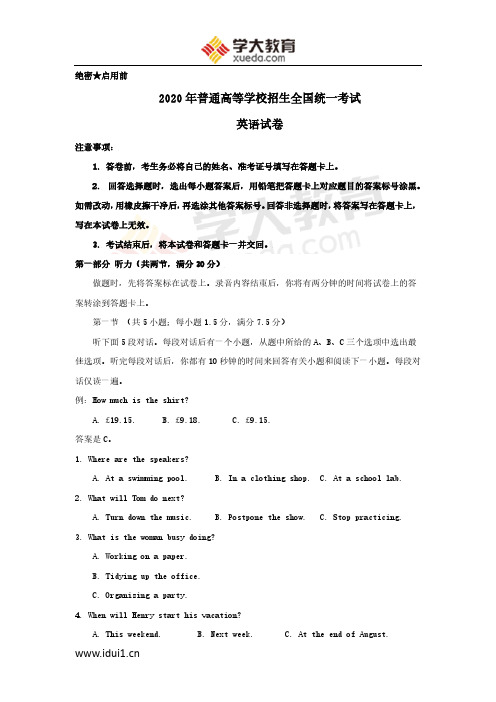
绝密★启用前2020年普通高等学校招生全国统一考试英语试卷注意事项:1. 答卷前,考生务必将自己的姓名、准考证号填写在答题卡上。
2. 回答选择题时,选出每小题答案后,用铅笔把答题卡上对应题目的答案标号涂黑。
如需改动,用橡皮擦干净后,再选涂其他答案标号。
回答非选择题时,将答案写在答题卡上,写在本试卷上无效。
3. 考试结束后,将本试卷和答题卡一并交回。
第一部分听力(共两节,满分30分)做题时,先将答案标在试卷上。
录音内容结束后,你将有两分钟的时间将试卷上的答案转涂到答题卡上。
第一节(共5小题;每小题1.5分,满分7.5分)听下面5段对话。
每段对话后有一个小题,从题中所给的A、B、C三个选项中选出最佳选项。
听完每段对话后,你都有10秒钟的时间来回答有关小题和阅读下一小题。
每段对话仅读一遍。
例:How much is the shirt?A. £19.15.B. £9.18.C. £9.15.答案是C。
1. Where are the speakers?A. At a swimming pool.B. In a clothing shop.C. At a school lab.2. What will Tom do next?A. Turn down the music.B. Postpone the show.C. Stop practicing.3. What is the woman busy doing?A. Working on a paper.B. Tidying up the office.C. Organizing a party.4. When will Henry start his vacation?A. This weekend.B. Next week.C. At the end of August.5. What does Donna offer to do for Bill?A. Book a flight for him.B. Drive him to the airport.C. Help him park the car.第二节(共15小题;每小题1.5分,满分22.5分)听下面5段对话或独白。
- 1、下载文档前请自行甄别文档内容的完整性,平台不提供额外的编辑、内容补充、找答案等附加服务。
- 2、"仅部分预览"的文档,不可在线预览部分如存在完整性等问题,可反馈申请退款(可完整预览的文档不适用该条件!)。
- 3、如文档侵犯您的权益,请联系客服反馈,我们会尽快为您处理(人工客服工作时间:9:00-18:30)。
2020年普通高等学校招生全国统一考试英语模拟测试本试卷共150分,考试时间120分钟。
考试结束后,将本试卷和答题卡一并交回。
注意事项:1.答题前,考生先将自己的姓名、考生号、考场号和座位号填写清楚,将条形码准确粘贴在条形码区域内。
2.选择题必须使用2B铅笔填涂;非选择题必须使用0. 5毫米黑色字迹的签字笔书写,字体工整、笔迹清楚。
3.请按照题号顺序在答题卡各题目的答题区域内作答,超出答题区域书写的答案无效;在草稿纸、试卷上答题无效。
4.作图可先使用铅笔画出,确定后必须用黑色字迹的签字笔描黑。
5.保持卡面清洁,不要折叠,不要弄破、弄皱。
不准使用涂改液、修正带、刮纸刀。
第一部分听力(共两节,满分30分)第一节(共5小题;每小题1.5分,满分7.5分)听下面5段对话。
每段对话后有一个小题,从题中所给的A、B、C三个选项中选出最佳选项,并标在试卷的相应位置。
听完每段对话后,你都有10秒钟的时间来回答有关小题和阅读下一小题。
每段对话仅读- - 遍。
1. Where was the man last night?A. At the cinema.B. In the hospital.C. At home.2. How much does the man want to pay for the scarf?A. $15.B. $17.C. $ 20.3. Why did the man hurt his back?A. He lifted too much weight.B. He didn't warm up before lifting.C. He isn't really a professional.4. What will Lucy be doing at 11 :30 tomorrow?A. Going out for lunch.B. Seeing her dentist.C. Visiting a friend.5. What's the man doing?A. Holding a party.B. Booking a room.C. Selecting baby beds.第二节(共15小题;每小题1.5分,满分22.5分)听下面5段对话或独白。
每段对话或独白后有几个小题,从题中所给的A、B、C三个选项中选出最佳选项,并标在试卷的相应位置。
听每段对话或独白前,你将有时间阅读各个小题,每小题5秒钟;听完后,各小题将给出5秒钟的作答时间。
每段对话或独白读两遍。
听第6段材料,回答第6、7题。
6. What is the man's favorite drink?A. Orange juice.B. Beer. .C. Cola.7. What does the man agree to get in the end?A. Some wine.B. Some beer.C. A bottle of orange.听第7段材料,回答第8、9题。
8. What is the weather like now?A. Warm.B. Snowy. .C. Windy.9. What will the speakers do tomorrow?A. Go skiing.B. Go skating.C. Go shopping.听第8段材料,回答第10至12题。
10. What do we know about the man?A. He often goes without breakfast.B. He's been late for work twice this week.C. He's always searching for his glasses.11. What did the man do after taking the shower?A. He read for a while.B. He looked for his glasses.C. He had breakfast.12. Where are the man' s glasses probably?A. In the bathroom.B. In the living room.C. In the dining room.听第9段材料,回答第13至16题。
13. What was the man asked to do?A. Return the book.B. Pay a fine.C. Find the book.14. What did the man explain to the woman?A. He lost the book.B. He left the book at home.C. He remembered returning the book.15. What did the man find on the shelf?A. The book he returned. B, The book he lost. C. The book he wanted to borrow.16. How did the mistake come about?A. The return wasn't recorded.B. The man returned a different book.C. The woman put the book on the wrong shelf.听第10段材料,回答第17至20题。
17. Which place will the travelers visit first?A. Pigeon Point.B. A seaside cafe.C. An ice cream factory.18. What should the travelers bring?A. Food.B. Medicine.C. Swimsuits.19. What animals will the travelers see in the nature park?A. Giraffes.B. Monkeys.C. Elephants.20. What extra costs may there be?A. Money for souvenirs.B. Tips for the tour guide.C. Tips for the hotel clerks.第二部分阅读理解(共两节,满分40分)第一节(共15小题;每小题2分,满分30分)阅读下列短文,从每题所给的A、B、C和D四个选项中,选出最佳选项。
AMarineLand Theme ParkWith numerous rides, a variety of wildlife from both land and sea, and shows filled with action-packed excitement, no wonder it's a hit with visitors from all over the world. Whether riding on the world's biggest steel roller coaster, Dragon Mountain, or enjoying a show filled with fun-loving dolphins and intelligent whales, you're sure to have the time of your life at MarineLand. Having been in business for more than 50 years, this park has something for every member of the family!Highlights & Attractions :The King Waldorf Stadium Show: This entertaining,educational and heart- warming show features dolphins, white whales, sea lions, and walruses and is sure to leave you in awe as well as help you understand and appreciate these wonderful marine mammals (海洋哺乳动物) .Arctic Cove: It featuring one of the largest white whale collections in the world, visitors are able to purchase a pass to Arctic Cove where they can touch and feed the whales as well as view them underwater,Friendship Cove: Breathtaking underwater viewing allows you to enter the magic world of the killer whale below the water surface or on a surface level walkway.Hotels ;Villager Lodge: It is located in Niagara Falls, Ontario.Diplomat Inn: Within half a mile of the Skylon Tower, it is the choice for an inexpensive location.Marriott Niagara Falls Fallsview Hotel &. Spa: It is close to popular attractions and the Scotiabank Convention Center.Days Inn Lundy's Lane: It is located just two miles from the gorgeous Niagara Falls and the Skylon Tower Observation Deck.Hours of Operation: 10:00 am-5:00 pm (Sept. 11th-Oct. 13th)Phone: 417-823-098121. What can be learned about MarineLand Theme Park?A. It is only suitable for kids.B. It was opened fifty years ago.C. It has both land and marine animals.D. It has the world's biggest roller coaster.22. What is special about Arctic Cove?A. It has the largest white whale collection in the world.B. It allows visitors to enter the magic world of the killer whale.C. It features an entertaining show starring various marine mammals.D. It provides visitors with a chance to interact with white whales personally.23. Which hotel suits you best if you have a tight budget?A. Diplomat Inn.B. Villager Lodge.C. Days Inn Lundy s Lane.D. Marriott Niagara Falls Fallsview Hotel &. Spa.BA few weeks ago, I bought a locally- grown salad from a vending machine (自动售货机). But then I immediately realized that it was packaged in a plastic jar.“I guess I live with this jar now and forever." I thought sadly as I stared down at my new child. .The salad jar was only the latest in a long line of examples of how I am addicted to the responsibility of reusing everything, trying to never throw anything away. Water bottles have been given second lives,and berry containers are transformed into Tupperware. I recently even looked at a plastic straw in my fruit juice: Could I reuse it too... ?Yet trying to squeeze my salad jar under my kitchen counter this weekend, I finally had to admit: Being an environmentalist has turned me into a hoarder (囤积者). While keeping a certain number of jars and vegetable bags will allow me not to buy new containers, at a certain point those 30 berry containers begin to get a bit unnecessary. Who am I kidding? Then one day I came across a blog post that asks accusingly, “Ar e you turning your own home into a landfill (垃圾填埋场)?”In my defense,there is absolutely no excuse not to be a conscious consumer. The solution is painfully obvious, but hard to admit: Delaying waste is not,in fact, rejecting waste. In an over-packaged, over-consuming culture, this can feel like a burden. While I refuse to throw away packaging, the fact remains: I already have it. The damage is done. I’ve been ignoring one of the most essential and difficult parts- reduce, reuse, recycle. Even if I go out of my way to reuse the waste I do have, I need to reduce what I am bringing home in the first place.While I might not be ready to go full zero-waste, it's a goal that is admirable to work toward. Until then, my salad jar child is going to make a great overnight oats jar.24. What does the author try to indicate by the last sentence in paragraph 2?A. How important reusing is.B. How enthusiastic she is about reusing.C. How she makes use of the plastic straw.D. Why she is responsible for reusing plastic straws.25. Why does the author say she has turned into a hoarder?A. She enjoys collecting a variety of small jars.B. She has saved far more containers than she needs.C. She likes the idea of saving fine packages in daily life.D. She stores more berry containers than other containers.26. What does the underlined word “this” in paragraph 4 refer to?A. Over packaging.B. Delaying waste.C. Over consuming.D. Rejecting waste.27. The author realizes at last that she should_____A. buy fewer over packaged goodsB. throw away unnecessary packagingC. reuse materials as much as possibleD. appreciate the value of recycling materialsCIt is common for adults to use “baby talk" when interacting with babies. This way of speaking attempts to imitate the sounds babies make when they first try to talk. But is this form of communication helpful to a child' s development?Several studies have suggested a clear link between parental language methods and a child's early language development. Studies showed that language learning in babies was improved when parents spoke more than a few simple words and used a wider vocabulary. Earlier research found that the style of speech used by parents to communicate with their baby could have an influence on language development.One such speaking style is known as “parentese”. Research has shown that babies react better to this kind of language in the first months of life. Generally, parentese involves adults speaking in a higher voice and at a slower speed. The languageis simplified, while sentences are short and often repeated. Studies from the past 30 years have confirmed that babies spoken to in parentese developed larger vocabularies throughout the first three years of life.A new study on the subject, a project of the University of Washington's Institute for Learning &. Brain Sciences, examined whether parents can be effectively taught methods to improve their parentese skills.Naja Ferjan Ramirez, working in the Institute for Learning &. Brain Sciences, said that the parents involved in the research were first shown the importance of language input for their baby' s development. Parents were then given suggestions on how to use different parentese methods, and then rated on how well they used these methods with their child. She added that the new study is important because there are still a lot of parents with little knowledge about how to use parentese to help their child.' This was one reason the researchers included parents from different cultural and economic groupings.28. How do parents usually talk with their babies?A. By speaking in a funny style.B. By copying babies' sounds.C. By raising speaking speed.D. By whispering in babies' ears.29. What can we learn from the second paragraph?A. Babies' language skills are decided by talent.B. Babies' language is improved by simple words.C. Parental language style helps improve babies' behavior.D. Parental language methods affect babies' language development.30. Where can you find how parents were trained in parentese skills?A. In paragraph 2.B. In paragraph 3.C. In paragraph 4.D. In paragraph 5. .31. What can be the best title for the text?A. Communicating with babies matters moreB. Parentese is a good way to practice languageC. The more parents help, the better babies learnD. Speaking parentese helps with babies' language learningDBeing an employee at a company has many challenges- you want job satisfaction, a work-life balance and promotion. Most of us aim to get a good salary to pay for the essential things in life. But when that s not enough, you have to do the hardest thing in the world- ask for a pay rise!Salary increases have been a sensitive issue recently. Due to the global economic recession(衰退),businesses had to tighten their belts. Most public sector pay in the UK, for example, was frozen for two years, and after that rises were limited to 1% - below the inflation rate (通货膨胀率). But later the government awarded them a pay rise above the 2% inflation rate. That means those who are on an average salary earn ₤1 ,000 extra a year.In some companies, a regular annual pay rise is the norm- all staff get a fixed increase in their monthly pay. In other firms, workers might get a bonus to reward them for their efforts or for meeting a target. But sometimes, a pay increase is something you have to ask for- and if you don't ask,you won't get!Not everyone is happy at being given a fixed pay rise-- they feel they re worth more and that they deserve more m oney.“It's not something we should f ear to ask for," says Pip Jamie son,founder of the professional networking site,The Dots.“No one has ever got fired for asking for a pay rise. In fact, asking for more money shows ambition and shows you want to stay with the company.BBC reporter Jamie Robertson says,“You need to find out what kind of pay your job should be getting. You'll need to give good reasons for wanting more money and you'll have to , keep your increase within your pay grade. Of course, if you can' t get more then you could ask for other perks, such as flexible working or more ti me off. But if your boss doesn’t budge, maybe it's time to quit and find a new job.”32. What can be learned about the UK from paragraph 2?A. Government has strict restrictions on businesses.B. High inflation directly resulted in higher public sector pay.C. Government aid was helpful to the steady growth in salaries.D. The economic crisis greatly influenced most public sector pay.33. How many ways of pay rises are mentioned in the text?A. Two.B. Three.C. Four.D. Five.34. What may happen if people ask for a pay rise according to Pip Jamieson?A. They may get fired.B. Their bosses may budge.C. They may get promoted.D. Their bonus may be cut down.35. In which section of a newspaper may this text appear?A. Society.B. Science.C. Business.D. Entertainment.第二节(共5小题;每小题2 分,满分10分)根据短文内容,从短文后的选项中选出能填人空白处的最佳选项。
